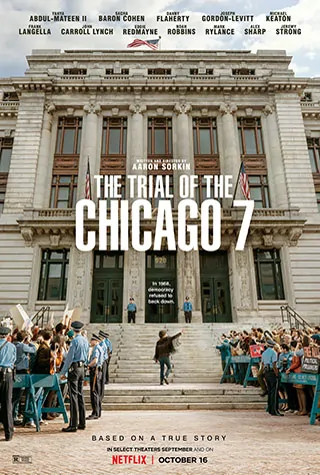| In August 1968, the Democratic National Convention convened in Chicago to select their presidential candidate. This was a turbulent year, which saw the assassinations and protests of Martin Luther King, Robert Kennedy and the Civil Rights Act. The Vietnam War escalated and cities across the globe were impacted by the growing anti-war sentiment. The Trial of the Chicago 7 is a dramatization of the trial of eight defendants, Bobby Seale’s case later being separated, who were charged by acting Attorney-General John Mitchell (” Molly’s Game“) of crossing state borders to incite a riot. After the Chicago Police Department brutally beat anti-war activist Rennie (Alex Sharp in “The Hustle“), the protests became ugly. Davis was hospitalized with concussion after being beaten by the Chicago Police Department. Tom Hayden, a demonstrator who stood up to Davis and the massive police force of Mayor Richard Daley as well as members of the Illinois National Guard started beating protesters indiscriminately. At the end of the first week, there had been 668 arrests. 400 people required first aid and 110 needed to be taken to hospital. On the convention floor, Connecticut Senator Abraham Ribicoff described the scene as “Gestapo tactic in the streets Chicago.” Although some of the police were present in response to the provocative statements made by the Youth International Party led by Abbie (Sacha Baron Cohen ” Alice Through the Looking Glass“) as well as Jerry Rubin (” The BIG Short“) it was evident that Mayor Daley was determined to defend his own domain. He was one of the few remaining big city bosses. The film does not provide much background, except for pictures of the Vietnam Draft, speeches by Robert Kennedy, and Martin Luther King, and in a lighter vein, the protest organizers talking about the fun they plan in Chicago. David Dellinger, John Carroll Lynch (The Founder), John Froines, Daniel Flaherty (The Meyerowitz Stories), and Lee Weiner, Noah Robbins (The Assistant) are all part of the ensemble cast. Frank Langella (Captain Fantastic) portrays Judge Julius Hoffman. Joseph Gordon-Levitt (Snowden), 33-year-old lead prosecutor Richard Schultz, is played by Mark Rylance, (“Ready Player 1“) as William Kunstler, the defense counsel. Michael Keaton’s performance as Ramsey Clark (Spiderman Homecoming) was outstanding. Unfortunately, the testimony was removed from the records. Baron Cohen’s Hoffman may be the most realistic of the characters. The others, Seale, Hampton and Rubin, are caricatures. Sorkin attempts to balance in the trial the outrageous behavior of Hoffman (once dressed as a judge) and Rubin, the drama of Bobby Seale (“Yahya Abdel-Mateen, ” us“) bound and gagged inside the courtroom in protest of the murder of Black Panther Leader Fred Hampton (Kelvin Harriman Jr., Lucie), and the incompetence and malice of the Judge, who dismisses objections before Tom Hayden, who later became a California State Assemblyman, is shown to be the one responsible in comparison with the Yippies. When Hoffman asks Hayden about his issue with him, Hayden replies that “My problem is in 50 years people will think of you when they think of progressive politics.” You and your idiot supporters will be remembered for giving daisies out to soldiers and attempting to lift the Pentagon. They won’t think about justice or equality. They won’t think about education, poverty or progress. They’re going to think of a bunch o’ stoned, lost losers who are disrespectful, foulmouthed and lawless. So we’ll lose the elections.” The Trial of the Chicago Seven has all the ingredients for an engaging experience: dramatic events, snappy dialog, comic relief and some raw, powerful moments. However, the film feels verbose, inorganic and perilously near to a TV Movie of the Week. The debate between Hoffmann and Hayden, while insightful and relevant to the storyline, is missing a sense of the 1960s culture or a clear understanding of the issues at hand. The film shows a group young people screaming, running and being beaten. However, it does not convey the reasons that led them to Chicago. We do not hear arguments in favor or against the war, which had lasted for four long years and stained the character and soul of the country. Sorkin ignores further the desperation of the demonstrators, who knew that the Democrats would be nominating a candidate, like Johnson had rejected North Vietnam’s overtures for peace in exchange for an end to bombing. Tom Hayden’s reading of the names of thousands of soldiers, some of whom were still in their teens, in court is the only way we can get an idea of what was going on. The Trial of the Chicago 7 comes to life when we discover that the soldiers who died had names. | |

The Trial of the Chicago 7 (2020)
Genre(s): Drama, History, Thriller
MPAA Rating:R
Director(s): Aaron Sorkin
Actor(s): Alex Sharp, Ben Shenkman, Caitlin FitzGerald, Eddie Redmayne, Frank Langella, J.C. MacKenzie, Jeremy Strong, John Carroll Lynch, Joseph Gordon-Levitt, Mark Rylance, Michael Keaton, Sacha Baron Cohen, Yahya Abdul-Mateen II
Writer(s): Aaron Sorkin
Producer(s): Marc Platt, Matt Jackson, Stuart M. Besser, Tyler Thompson
Studio(s): DreamWorks, Amblin Entertainment, Cross Creek Pictures, Double Infinity Productions, MadRiver Pictures, Marc Platt Productions, Netflix, Paramount Pictures, Reliance Entertainment
Length:129 minutes
Release Date(s):US: October 16, 2020 | UK: October 16, 2020




